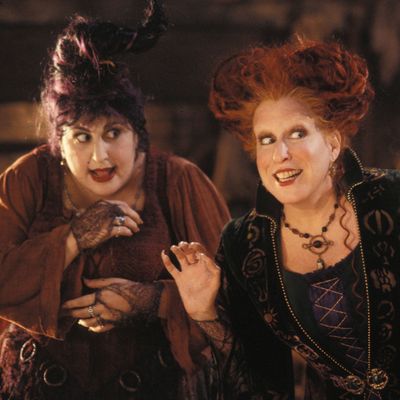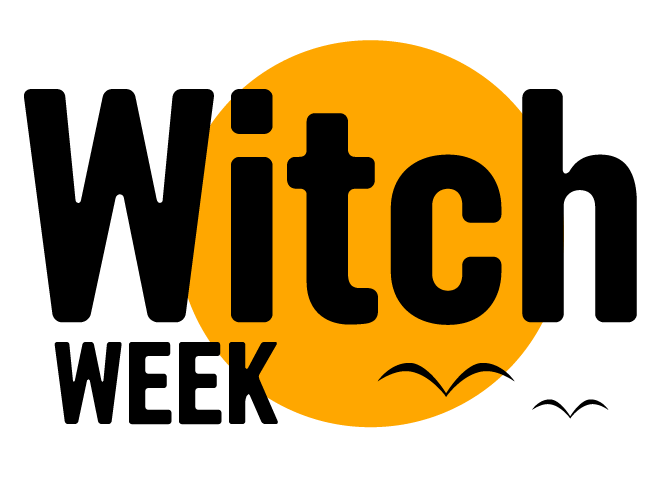
In TV, movies, and real life, women have been at the forefront of the year’s biggest stories — so this Halloween season, we’re looking at pop culture’s most wicked depiction of female power.
The 21st century has ushered in a slew of new October traditions: “spooky” Twitter handles, social-media battles over the merits of pumpkin-spice everything — and of course, endless TV showings of Hocus Pocus. Much like the Sanderson sisters themselves, the 1993 Disney comedy about a trio of resurrected Salem witches has had a shockingly successful afterlife. Freeform’s annual autumnal reruns of the movie reliably draw tens of millions of viewers each year. The film zooms toward the top of the DVD sales charts every October. And in the ultimate sign of pop-culture success, plans are now underway for a TV remake of Hocus Pocus in time for next year’s 25th anniversary. Millennial nostalgia — and perhaps some masterful marketing — has transformed a movie critics once dismissed as “an unholy mess” and a “chaotic jumble” into an unlikely Halloween classic.
It’s hard to overstate just how much the movie critics of the day loathed Hocus Pocus. Gene Siskel and Roger Ebert, whose thumbs up/thumbs down verdicts could make or break films back then, hated Hocus Pocus enough to include it in their annual worst-of-the-year show. “Watching the movie is like attending a party you weren’t invited to, and where you don’t know anybody, and they’re all in on a joke but won’t explain it to you,” Ebert wrote in his print review, singling out star Bette Midler for specific scorn. (She “tries to use noise as a substitute for acting,” he sneered.) Entertainment Weekly’s critic in 1993, Ty Burr, also seemed particularly bummed to see Midler slumming it in Disney comedy. “The sight of the Divine Miss M. mugging her way through a cheesy supernatural kiddie comedy is, to say the least, dispiriting,” he lamented.
One critic actually ended up predicting quite accurately the short-term trajectory for Hocus Pocus. The Washington Post’s Desson Howe, after slamming director Kenny Ortega for treating his cast “as if they were characters in a third-rate musical such as his recent Newsies,” scoffed that the film was little more than “another future videotape disguised as a movie. In the not-too-distant future look for Hocus Pocus in the rental-store bins.” Howe obviously meant his review as a diss, and he was pretty spot-on about the film’s short-term fate. It did tank with moviegoers that summer, dropping out of the top ten within three weeks and grossing a disappointing (even for 1993) $39 million in theaters. Hocus Pocus didn’t make much of an immediate splash in the home-video market, either. According to Billboard charts, it sold modestly when it was first released on videocassette back in January 1994, and then sort of faded away — at least in video stores.
But where Hocus Pocus never died — and, arguably, where it returned to life — was on television. Since the film was produced by Disney and had some built-in appeal for kids, it became a natural fit for the company’s Disney Channel cable network, which would regularly air the movie in October during the latter part of the 1990s. Then, when Disney assumed ownership of Fox Family Channel in 2002 and turned it into ABC Family, Hocus Pocus started showing up on 13 Nights of Halloween. A generation of millennials who had seen the movie when it was in theaters — or more likely, never saw until it hit TV — suddenly began associating Hocus Pocus with Halloween, viewing it with the same reverence ’70s and ’80s kids had for It’s the Great Pumpkin, Charlie Brown and the “Thriller” video.
About a decade ago, execs at ABC Family/Freeform noticed ratings for Hocus Pocus would pop compared other titles included on the 13 Nights of Halloween schedule. It’s no wonder the film airs so frequently during the two-week stunt: 11 times last year and 19 times this fall, thanks to a first-ever, full-day Hocus Pocus marathon on Halloween. “It does huge numbers for us, year after year after year,” says current Freeform president Tom Ascheim. He’s not exaggerating about the movie’s reach each year. Some individual showings of the film notched over 1.5 million viewers last year, with one telecast ranking as the second-most-watched film on all of basic cable during October 2016. More impressively, Freeform estimates a stunning 23.4 million viewers watched the movie on the channel last year. The TV exposure seems to have boosted DVD sales as well: By the end of the last decade, Disney had sold around a quarter-million units of the film, according to the revenue tracking website the Information. By the end of 2016, that number was approaching 3.5 million. (It helps that Disney has kept the movie off big subscription video-streaming sites such as Netflix and Hulu, making it available only for rental or purchase.)
Ascheim does not pretend to know exactly why Hocus Pocus has become so popular — “I wish I understood how to make a phenomenon,” he laughs — but he has some theories. “For [millennials], I think it’s nostalgia,” he says. “They get to wander back to that moment when Halloween was important in their lives.” And while the movie is mostly campy fun, the female-focused aspect of Hocus Pocus shouldn’t be overlooked when considering the reasons for its success. “There’s something about strong women who have power which resonates for lots of people, both men and women,” Ascheim says.
But perhaps the biggest driver of the Hocus Pocus resurgence is that, despite a few spooky moments, it’s a comedy and not a scarefest. Sure, hard-core horror movies also pull a crowd this time of year: AMC’s FearFest block of horror movies is a monster hit in its own right. But “funny pulls a wide audience,” Ascheim notes. “It’s easy [for viewers] to go back year after year with their family or their posse of friends … Some titles become traditions in people’s lives.” Freeform has seen a similar trend play out with its even more popular 25 Days of Christmas event, where sentimental fare takes a back seat to big audience draws like Will Ferrell’s modern classic Elf. “It’s not the sacred part of Christmas [that works], and it’s a similar phenomenon with Halloween,” Ascheim says.
While Freeform will put viewers’ love for Hocus Pocus to the test this Halloween by nearly doubling the number of airings — and by making it available to stream on the Freeform app and website — next year’s 25th anniversary should usher in an even bigger frenzy. News broke last month that Freeform sister network Disney Channel is developing a modern remake of the film for next fall, with a new cast and a new director. Assuming the project goes forward, Ascheim says he’s definitely interested in the new version airing on Freeform as well as Disney. “We’ve been talking to them about it,” he says. “We hope to make a big deal out of next year.”





